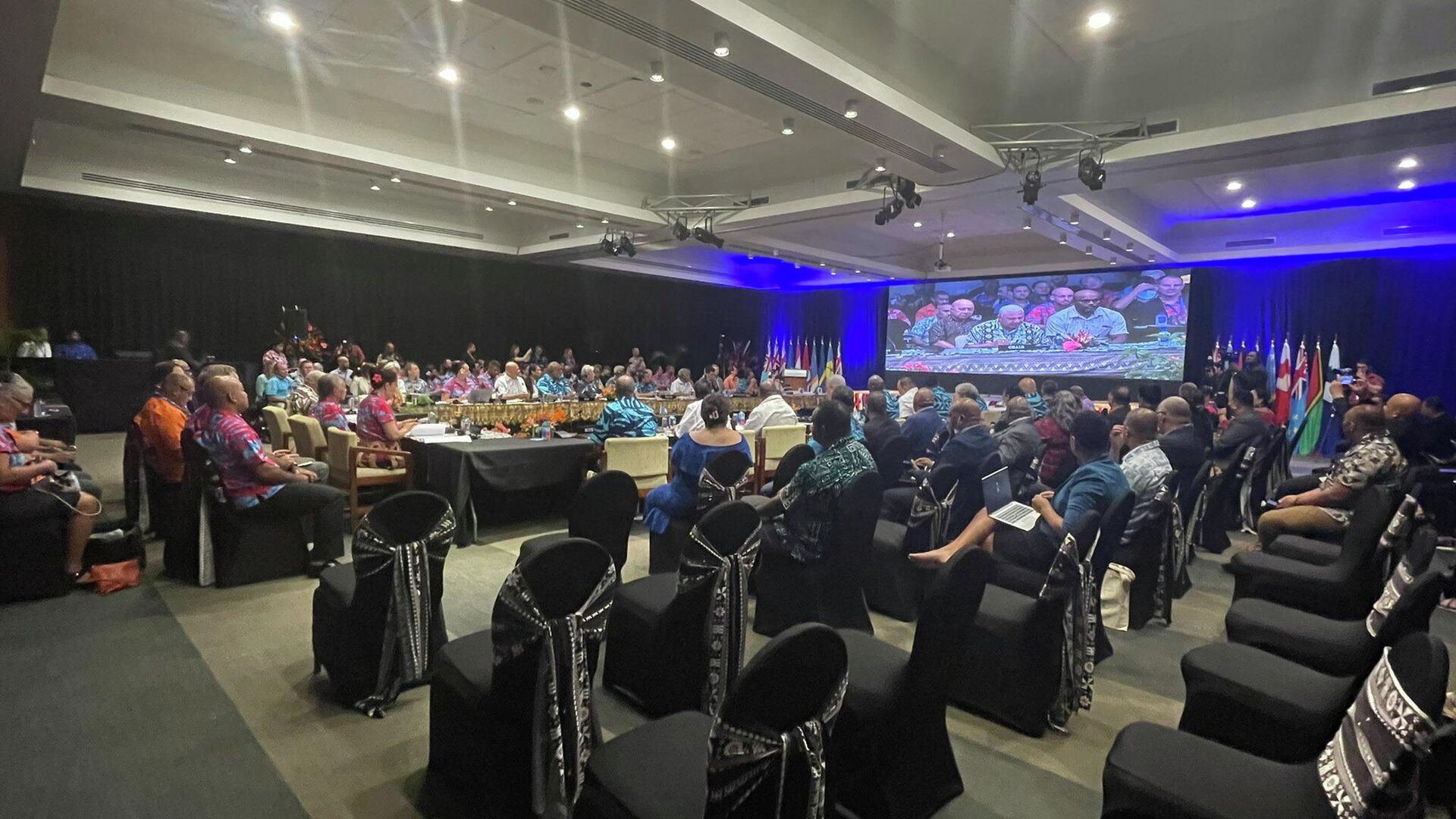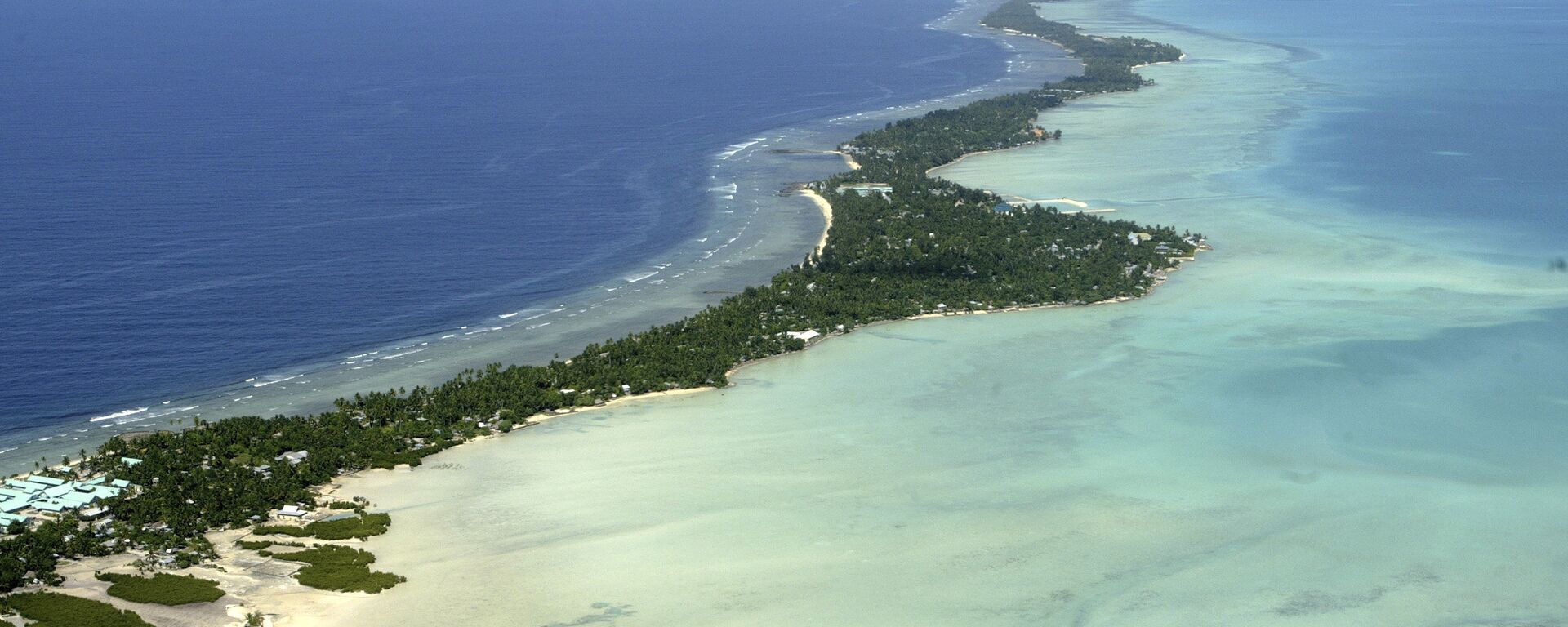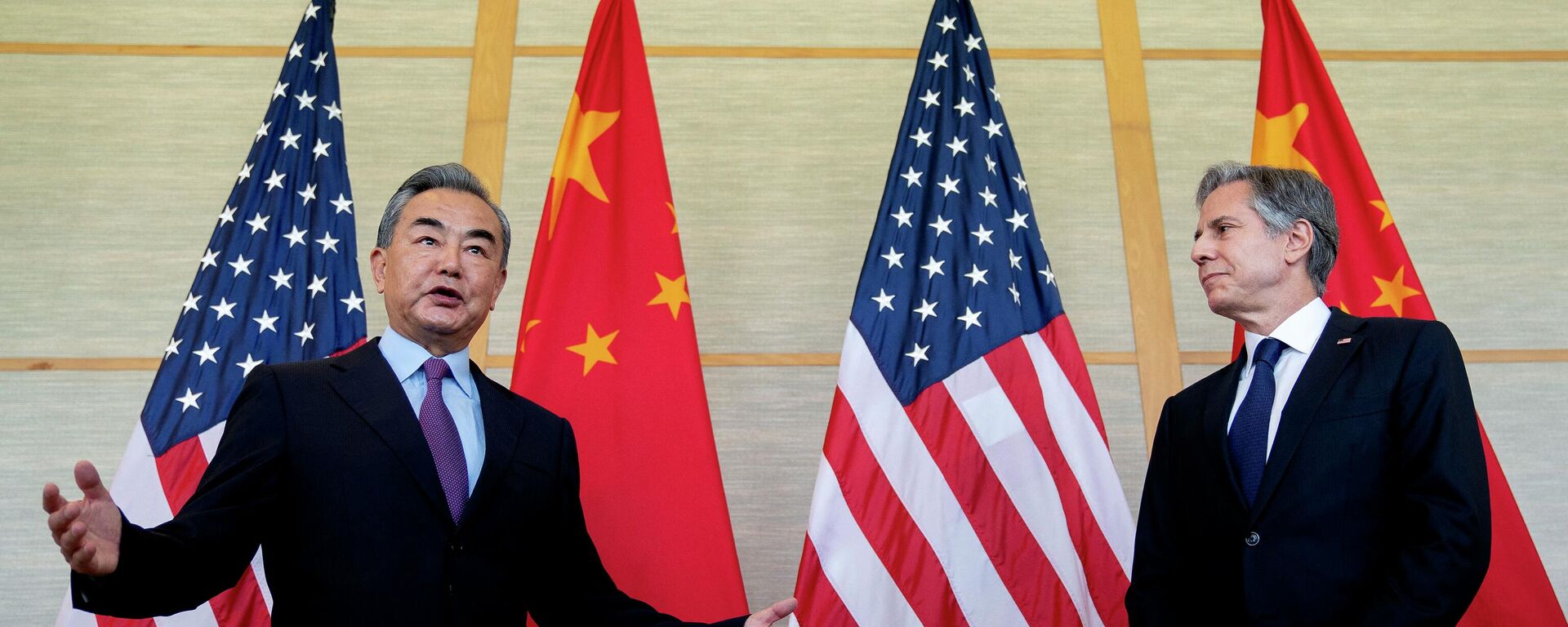US Pledges $60 Million For Pacific Islands, ‘Expands Footprint’ to Offset China's Growing Sway

© Photo : Pacific Islands Forum/twitter
Subscribe
The Pacific Islands Forum in Fiji on July 11-14 has brought the leaders of the nations together to discuss how to garner more international support and funding to fight issues such as the impact of rising sea levels and climate change, as well as China's hopes for bolstered security ties across the region.
Pacific island leaders at their forum in Fiji have welcomed a promise by Washington to triple aid to the region.
Funding for Pacific islands would reach $US60 million a year for a decade, subject to approval by Congress, announced US Vice President Kamala Harris in a video address on Wednesday.
Dynamism and Democracy at the Pacific Islands Forum with United States Vice President Kamala Harris presenting to forum leaders about new US embassies in Tonga and Kiribati, USAID and Peace Corps. Video link: https://t.co/OfDscgGaAX pic.twitter.com/ajFqRrMDxY
— USAID PacificIslands (@usaidpacificisl) July 13, 2022
The financing would go towards such issues as combating illegal fishing, boosting climate resilience, marine planning and conservation, enhancing maritime security.
Kamala Harris called for Pacific nations to "stand united" as “bad actors” seek to undermine the international rules-based order.
"We recognise that in recent years that Pacific islands may not have received the diplomatic attention and support that you deserved," Harris added.
The White House has also announced upcoming discussions to set up new US embassies in the islands of Tonga and Kiribati, a US envoy to the Pacific Islands would be appointed shortly to ensure nations keep a "close partnership," according to The Washington Post.
"It really shows the US are back and want to play an active role," Palau President Surangel Whipps Jr. was cited as saying after Harris's speech. Fiji's Prime Minister Frank Bainimarama hailed a fishing treaty being renewed between Pacific island nations and the US as a platform to "balance" strategic weaknesses in the region.
Australia's Prime Minister Anthony Albanese said it was important the United States was increasing support, adding:
"We very much welcome the Biden administration's increased presence in the region.”
‘Stepping Up Our Game’
The decision to hike up the previously stagnant funding to the region comes as Washington scrambles to restore some of its influence in a region where China is becoming increasingly assertive.
"We're expanding out footprint and making sure that we have the people and the apparatus in place to deepen our cooperation on a day-to-day basis and to deliver concrete results. And these deliverables emerge from close consultations with the region in recent weeks and months, and we believe that this series of steps is responsive to their priorities," a senior administration official was cited as telling reporters ahead of the vice president’s PIF address.
Concerns have been triggered in Washington amid China's increasing involvement with the Pacific island nations, some situated in close proximity to the largest US military command in Hawaii. Beijing has intensified negotiations with the Pacific nations, seeking a broad regional trade and security deal with 10 nations that it has ties with.
In 2019, both Kiribati and the Solomon Islands switched their diplomatic recognition from Taiwan - governed independently since breaking from mainland China - to Beijing, which sees the island as its province. Chinese Foreign Minister Wang Yi visited the two Pacific countries in late May to sign bilateral agreements with each.
Weighing in on China’s actions, the unnamed US official was cited as saying:
“We are focusing on our own engagement and our own interests and our own support. Of course contrasts [with China] will be made, and we would like to think that contrast looks favorably on us, where we’ve been a responsible security actor in the region, in fact, in the entire Indo-Pacific, for many decades and have helped to preserve a free and open Indo-Pacific.”
The remote Pacific island nation of Kiribati had earlier announced its shock withdrawal from the Pacific Islands Forum (PIF). The dispute was said to be over the perceived breaking of a handshake agreement that a Micronesian leader would become the next PIF Secretary General, while in fact former Cook Islands prime minister Henry Puna secured the post.
"Kiribati has taken the sovereign decision to withdraw from the Pacific Island Forum with immediate effect," said a letter from Kiribati to the forum secretariat, circulated to several Pacific media outlets on Sunday.
Tuvalu Foreign Minister Simon Kofe was cited by Reuters as saying that "geopolitical competition and tug of war that we are seeing right now between China and the US" had been discussed in Friday's meeting of the Pacific islands’ leaders, and ministers had underscored the need for the region to “define their future themselves and the terms in which we will engage China and the U.S."
The US official was cited as saying the Biden administration was “concerned” by Kiribati’s withdrawal, adding that discussions over the issue were ongoing.
Meanwhile, a Chinese foreign ministry spokesperson told a news briefing on Monday that "China has enjoyed good cooperation with the Pacific Island Forum for many years."
Earlier, the head of the Chinese delegation to the 15th Post Forum dialogue in Auckland, Zhou Whenzhong, the Chinese Vice Foreign Minister, told journalists that China would explore ways to cooperate with the Pacific region countries, adding that the Chinese government is committed to working with members countries of the Pacific Island Forum (PIF) to enhance bilateral and multilateral ties.


